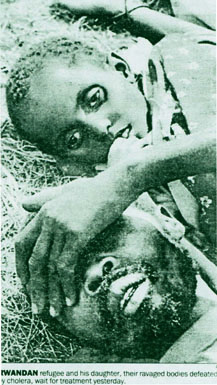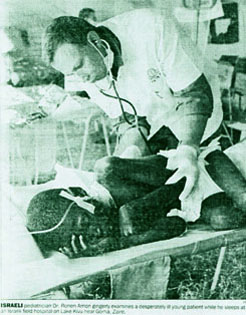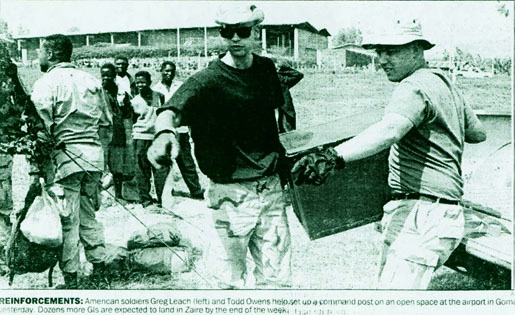 by MICHAEL O. ALLEN in Nairobi and RICHARD SISK in Washington, Daily News Staff Writers | Friday, July 29, 1994
by MICHAEL O. ALLEN in Nairobi and RICHARD SISK in Washington, Daily News Staff Writers | Friday, July 29, 1994
United Nations relief officials lashed out yesterday at what they viewed as the timid, pinch-penny response of the U.S. and its allies to the desperate plight of Rwanda’s refugees.
 All member states of the UN must share the blame, but among the Western allies, “many are worried about their budgets. They think it costs too much,” said Peter Hansen, the UN’s undersecretary general for humanitarian affairs.
All member states of the UN must share the blame, but among the Western allies, “many are worried about their budgets. They think it costs too much,” said Peter Hansen, the UN’s undersecretary general for humanitarian affairs.
“Some are worried about being dragged into something where they might get hurt, there might be trouble and, “Gee, what if another soldier gets shot?’ ” Hansen said in a reference to U.S. reluctance to become involved after suffering casualties in Somalia.”
Hansen, who spoke in Nairobi after returning from a fact-finding mission to Rwanda and Zaire with international aid groups, described scenes of suffering and macabre indifference.
The human tragedy brought on by the flight of more than a million Rwandan refugees to the border town of Goma, Zaire, also has triggered resentment among local Zairians, who have demonstrated in recent days to protest the burden on their scarce resources.
“You have heard of different ways people set up roadblocks? In Goma, they made roadblocks with corpses. That was what was most easily available to the people in Goma,” Hansen said.
However, in Washington, Gen. John Shalikashvili, the chairman of the Joint Chiefs of Staff, insisted that the U.S. was doing all that was possible to fight the cholera epidemic killing nearly 2,000 dialy in the refugee camps.
He said the best way to wind down the crisis was to encourage the refugees to return home in safety.
“Time is of the essence. The greatest hope they have is to leave those camps,” Shalikashvili said, but “we don’t want to get into a situation where we are forcing them to go home.”
The general said the U.S. was considering targeted relief airdrops along routes back to Rwanda to give the refugees sustenance for the journey.
He would not say exactly how many U.S. troops might be involved in the humanitarian campaign–which is expected to be up to 4,000–because it still is “at a concept plan stage.”
Meanwhile, Army Lt. Gen. Daniel Schroeder also arrived in the Rwandan capital of Kigali to assess the possibility of having U.S. troops use the airport there as a base fo
r relief operations.
But time was running short, and an already dire situation could get even worse, Peter Walker, director of disaster policy for the International Red Cross, said in Nairobi.
The refugees, “if they are going to harvest their crops, have to go home in the next two weeks,” Walker said. “If they are going to plant for the next season, they have to go home by September. These are very tight deadlines.”

Leave a Reply